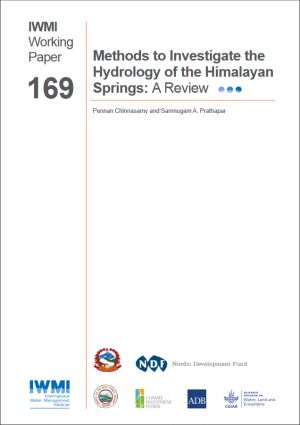(IWMI Working Paper 169)
 Springs are the major source of freshwater in many small mountainous watersheds within the Himalayan region. In recent years, their flow rates have diminished, but the reasons for this are not self-evident, and hence this paper reviews the methods to investigate Himalayan springs. The review reveals that chemical and isotope analyses – mostly water dating and stable isotope (e.g., δ18O) analyses – could be an appropriate entry point to commence field investigations, because of their potential to map complex spring pathways, including linkages between aquifers. This should be combined with the building of hydrogeological maps with the available data. Output from desktop analyses, field investigations and hydrogeological maps could then contribute to the establishment of a conceptual model, which could form the basis for a numerical model.
Springs are the major source of freshwater in many small mountainous watersheds within the Himalayan region. In recent years, their flow rates have diminished, but the reasons for this are not self-evident, and hence this paper reviews the methods to investigate Himalayan springs. The review reveals that chemical and isotope analyses – mostly water dating and stable isotope (e.g., δ18O) analyses – could be an appropriate entry point to commence field investigations, because of their potential to map complex spring pathways, including linkages between aquifers. This should be combined with the building of hydrogeological maps with the available data. Output from desktop analyses, field investigations and hydrogeological maps could then contribute to the establishment of a conceptual model, which could form the basis for a numerical model.
Chinnasamy, Pennan; Prathapar, Sanmugam A. 2016. Methods to investigate the hydrology of the Himalayan springs: a review. Colombo, Sri Lanka: International Water Management Institute (IWMI) 28p. (IWMI Working Paper 169) [DOI] | Fulltext (1 MB)

